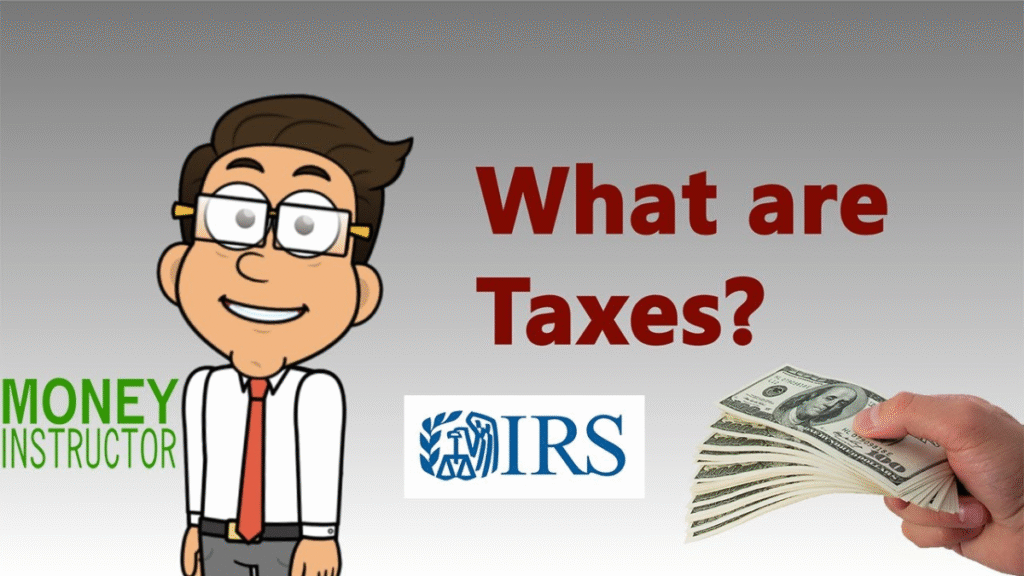Taxes are a crucial part of any country’s economy, and understanding how they work can save you both time and money. Whether you’re a student, a first-time employee, or someone trying to take charge of your personal finances, understanding taxes is an essential skill.
What Are Taxes?

Taxes are mandatory payments made by individuals or entities to the government. These payments fund public services such as infrastructure, education, healthcare, defense, and social programs. Taxes are collected at different levels—local, state, and national—and vary based on income, purchases, property, and other criteria.
Why Do We Pay Taxes?
Taxes serve several key purposes:
- Funding Public Services: Taxes pay for essential services like roads, schools, and emergency services.
- Redistributing Wealth: Progressive taxation helps reduce income inequality.
- Encouraging or Discouraging Behaviors: Tax credits may encourage education, while sin taxes discourage harmful habits like smoking.
Types of Taxes You Should Know
Understanding different types of taxes can help you plan and manage your finances better.
1. Income Tax
This is a tax on the money you earn from your job, freelance work, or investments. It’s usually a progressive tax—meaning the more you earn, the higher the percentage you pay.
2. Sales Tax
Sales tax is added to the price of goods and services at the point of purchase. Rates vary by state or region and are usually visible on your receipt.
3. Property Tax
Property tax is levied on real estate and sometimes on vehicles. It’s usually calculated based on the property’s market value.
4. Capital Gains Tax
When you sell investments like stocks, bonds, or real estate for a profit, you may have to pay capital gains tax.
5. Payroll Taxes
These taxes are deducted from your paycheck and go towards funding social security and healthcare programs.
6. Self-Employment Tax
If you’re self-employed, you’re responsible for paying both the employee and employer portions of payroll taxes.
7. Excise Tax
These are taxes on specific goods like fuel, tobacco, or alcohol. Often included in the price, they’re less visible but still impact your budget.
8. Estate and Gift Taxes
These taxes apply to large inheritances or gifts above a certain threshold.
How Is Tax Calculated?
Understanding how your tax is calculated helps you prepare financially.
Gross Income vs. Net Income
- Gross income is the total income before any deductions.
- Net income is what you take home after taxes and other deductions.
Tax Brackets
Tax brackets define different levels of income that are taxed at different rates. The more you earn, the higher your marginal tax rate will be.
Deductions and Credits
- Deductions reduce your taxable income.
- Credits directly reduce your tax liability.
Common deductions include student loan interest, retirement contributions, and mortgage interest. Tax credits can be for education, child care, or energy-efficient upgrades.
Filing Taxes: Step-by-Step
Filing your taxes might seem overwhelming, but it can be simplified with a few steps.
Step 1: Gather Financial Documents
Collect income forms, expense records, and documentation for deductions and credits.
Step 2: Choose a Filing Method
You can file taxes manually, use tax software, or consult a tax preparer (although we’re not naming agents or companies here).
Step 3: Fill Out the Tax Return
Enter your income, deductions, and credits to determine your tax liability or refund.
Step 4: Submit Before the Deadline
Missing the deadline can result in penalties. It’s crucial to file on time or request an extension.
Step 5: Pay Any Taxes Owed or Track Refund
If you owe taxes, pay them promptly. If you’re owed a refund, you can usually track its status online.
Common Tax Terms Beginners Should Know
W-2 and 1099 Forms
- W-2: For employees, shows how much you earned and how much tax was withheld.
- 1099: For freelancers or independent contractors, shows non-salaried income.
Standard Deduction vs. Itemized Deduction
- Standard Deduction: A fixed amount you can subtract from your income.
- Itemized Deduction: Specific expenses like medical bills or charitable donations that you list individually.
Taxable Income
This is the amount of income that is subject to taxes after all deductions.
Adjusted Gross Income (AGI)
Your AGI is your total gross income minus specific adjustments like student loan interest or retirement account contributions.
Tax Planning Tips for Beginners
Being proactive with your taxes can prevent stress and help maximize savings.
1. Keep Accurate Records
Hold onto receipts, pay stubs, and statements to make filing easier.
2. Understand Withholding
Check your paystub to ensure the right amount of tax is being withheld. Adjust it if needed.
3. Maximize Deductions and Credits
Know what you qualify for—especially educational, childcare, and energy efficiency credits.
4. Set Reminders for Deadlines
Use digital calendars or apps to avoid missing due dates.
5. Start Early
Don’t wait until the last moment to start your taxes. Early filers often receive quicker refunds.
What Happens If You Don’t Pay Taxes?
Failing to file or pay your taxes can lead to serious consequences:
- Penalties and Fines
- Interest Accumulation
- Seizure of Assets
- Legal Action
- Credit Score Impact
It’s always better to file—even if you can’t pay the full amount. Payment plans are usually available.
Tax Benefits You Should Know About
There are many tax incentives that can help reduce your burden:
- Education Credits: For tuition, books, and other school expenses.
- Retirement Contributions: Contributions to retirement accounts may lower your taxable income.
- Health Savings Accounts: Contributions are often tax-deductible and can be used for medical expenses.
- Child Tax Credit: Offers financial relief for families with children.
How to Stay Updated on Tax Laws

Tax laws can change each year. Stay informed through:
- Government tax websites
- Official tax publications
- News outlets that focus on personal finance
- Financial education platforms
Mistakes Beginners Often Make
Avoid these common errors:
- Filing late or not at all
- Incorrect income reporting
- Missing deductions or credits
- Using outdated tax software or forms
- Failing to sign or date returns
Digital Tools for Tax Tracking
While we’re not listing specific software, there are many apps and platforms that can help with:
- Income tracking
- Expense categorization
- Tax estimation
- Reminder alerts
- Document storage
Look for tools that offer ease of use and are updated with the latest tax codes.
When Should You Seek Help?
While beginners can often handle simple returns, consider seeking help if:
- You have multiple income sources
- You bought or sold investments
- You started a business
- You’re confused about deductions or credits
Also Read : Personal Finance Hacks to Grow Your Wealth
Conclusion
Understanding taxes doesn’t have to be intimidating. With a little knowledge and preparation, even beginners can manage their tax responsibilities confidently. Learning the basics now will not only help you avoid mistakes but also empower you to make smarter financial decisions in the future.
FAQs
What is the deadline for filing taxes?
Tax deadlines vary by country, but it’s usually in the first quarter of the year. Mark your calendar and file early.
Do I have to file taxes if I didn’t earn much?
You might still need to file, especially if you had taxes withheld or qualify for a refund or credits.
Can students file taxes?
Yes, especially if they have part-time jobs or scholarships that count as income. Students may also qualify for education credits.
What happens if I file late?
You may incur penalties and interest. Always try to file on time or request an extension.
Are refunds taxable?
No, your tax refund is not considered taxable income—it’s just a return of the money you overpaid.
How can I reduce the taxes I owe?
Maximize deductions, claim available credits, contribute to retirement accounts, and track expenses year-round.
What is the difference between a deduction and a credit?
Deductions reduce your taxable income, while credits reduce your tax bill directly.







